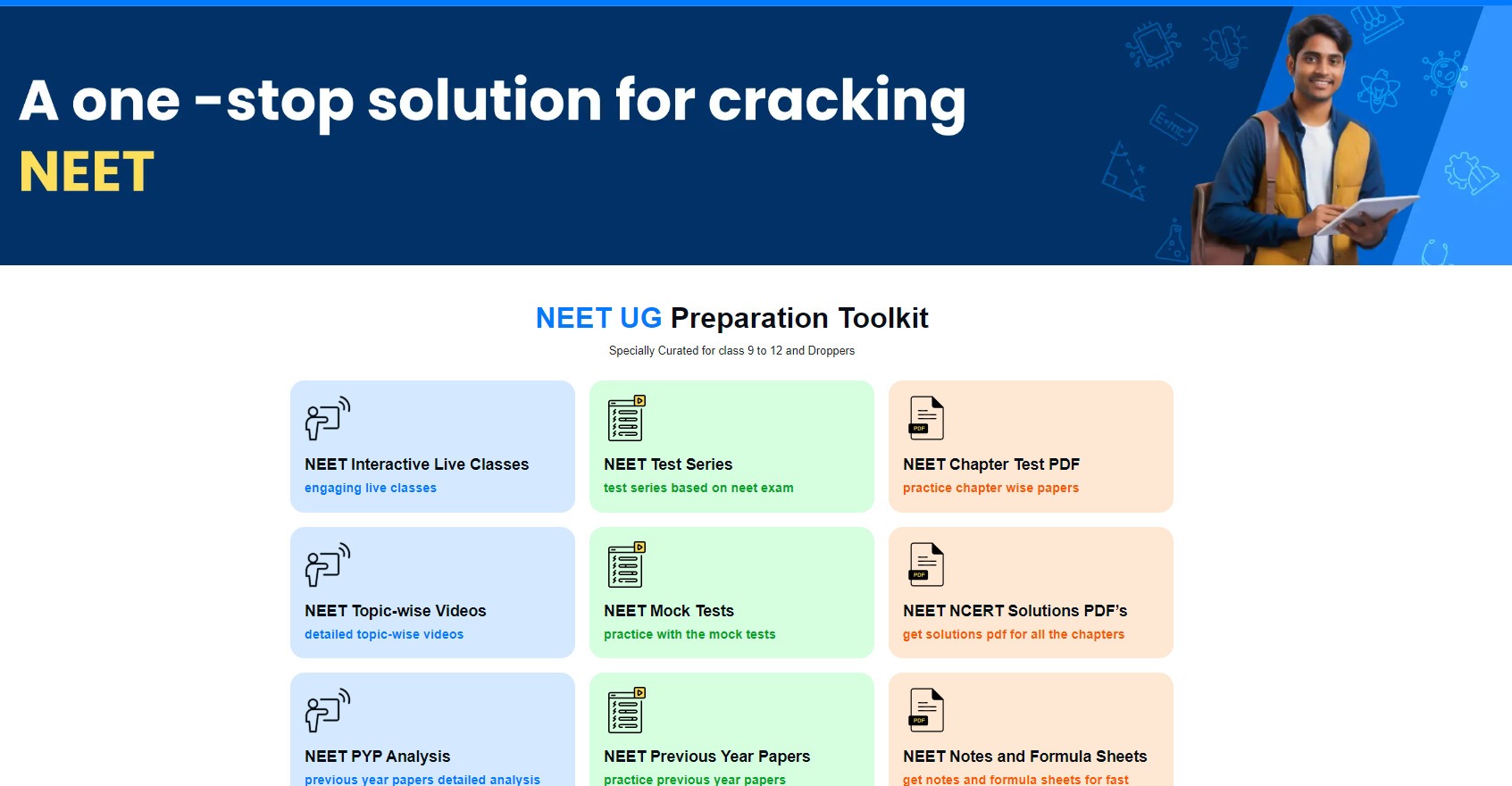Table of Contents
5 Months Study Plan for NEET 2025: The 5 month Study Plan for NEET 2025 helps students target a 650+ score, even starting from zero. Experts have created an 5 month study plan for NEET 2025 to help aspirants crack the NEET Exam. This plan offers a well-structured timetable and strategies to boost preparation, even for beginners starting from zero.
The last 5 months before NEET 2025 are crucial for aspirants aiming to secure a top score. With NEET 2025 being the key to admission in courses like MBBS, BDS, AYUSH, and B.Sc Nursing, a well-organized study plan is essential. Starting now gives students enough time to focus on the NEET syllabus, especially on Biology, Chemistry, and Physics. Prioritize studying from NCERT textbooks, as many questions come directly from these. Balancing NEET preparation with Class 12 board exams can be challenging, but staying consistent and revising regularly will help you manage both. Following this structured approach, combined with effective time management, will greatly improve your chances of success in NEET 2025.

NEET 2025 Exam Overview
| Particulars | Details |
|---|---|
| Exam Name | National Eligibility cum Entrance Test (NEET) |
| Conducting Authority | National Testing Agency (NTA) |
| Courses Offered | MBBS, BDS, Nursing, AYUSH |
| Exam Level | National Level Exam |
| Exam Mode | Offline (Pen & Paper Based) |
| Application Release | February 2025 (Tentative) |
| NEET 2025 Exam Date | May 2025 (Tentative) |
| Age Limit | Minimum 17 Years |
| Number of Candidates (Last Year) | Over 24 Lakh |
| Exam Frequency | Once a Year |
| Official Website | neet.nta.nic.in |
5 Months Study Plan for NEET 2025 Exam
The following 5 months Study plan for NEET Exam will help candidates to prepare effectively for their exam. If aspirants follow this approach then it will surely help them in securing 650+ marks in NEET 2025 exam.
Months 1 and 2: Building a Strong Foundation
This period is crucial for understanding core topics and developing effective study habits.
- Physics: Dive into essential topics such as Motion, Work, Energy, Power, Rotational Motion, and Gravitation. Utilize NCERT textbooks for a solid grasp of these concepts and practice related numerical problems. Create concept maps to visualize the connections between these topics, which can aid retention and comprehension.
- Chemistry: Use NCERT textbooks and additional resources to build a solid foundation. To memorize key points and formulas, create flashcards for quick reference and revision.
- Biology: Enhance your understanding by drawing diagrams and charts to illustrate processes. Practice multiple-choice questions (MCQs) from NCERT to familiarize yourself with the exam format. Reviewing biological processes and their implications in real-world scenarios can further strengthen your grasp of the subject.
Month 3: Developing Analytical Skills
As you progress, the third month will be about enhancing your analytical skills and increasing problem-solving capabilities.
- Physics: Shift your focus to Dynamics, Thermodynamics, and Waves. Engage in problem-solving sessions to tackle numerical questions. Use online simulations and animations to visualize complex concepts like wave motion and thermodynamic processes, which can provide a clearer understanding.
- Chemistry: Explore topics such as Chemical Thermodynamics, Equilibrium, and Redox Reactions. Apply your theoretical knowledge by solving various numerical problems. Participate in group discussions or study groups to exchange ideas and clarify doubts regarding chemical processes.
- Biology: Concentrate on Human Anatomy and Physiology. Create detailed notes highlighting major systems, their functions, and interconnections. Engage in active learning by teaching concepts to peers, which can reinforce your understanding and reveal any gaps in your knowledge.
Month 4: Integration and Application
This month focuses on integrating knowledge across subjects and applying concepts to solve problems.
- Physics: Delve into topics like Optics and Modern Physics. Work on understanding light behavior and its applications. Solve previous years’ NEET papers to get accustomed to the question format and identify frequently asked concepts.
- Chemistry: Cover Organic Chemistry fundamentals, including Hydrocarbons, Functional Groups, and Isomerism. Focus on reaction mechanisms and practice writing balanced equations. Use visual aids, such as flowcharts, to summarize organic reactions for better retention.
- Biology: Study Ecology, Evolution, and Biodiversity. Create charts to compare different ecosystems and their characteristics. Regularly practice MCQs to enhance your application skills and test your knowledge in real exam scenarios.
Month 5: Intensive Revision and Mock Tests
In the fifth month, the focus shifts to revising all subjects and taking mock tests to assess your preparedness.
- Physics: Review all previously studied topics. Conduct self-assessments by solving mock tests and previous years’ papers. Analyze your performance to identify strengths and weaknesses, and adjust your study plan accordingly.
- Chemistry: Revisit key concepts in Physical and Inorganic Chemistry. Use a mix of NCERT and reference materials to clarify complex topics. Engage in timed quizzes to improve speed and accuracy in solving questions.
- Biology: Consolidate your knowledge by revising all chapters, focusing on areas that are commonly tested in NEET. Participate in group study sessions to discuss challenging topics and quiz each other to reinforce learning.

Best Time Table for NEET Preparation in 5 Months
| Month | Focus Area | Daily Study Hours | Key Activities |
|---|---|---|---|
| December 2024 | Theory & Conceptual Understanding | 5-6 hours |
|
| January 2024 | Topic Revision & Practice | 6-7 hours |
|
| February 2025 | Intensive Practice & Time Management | 7-8 hours |
|
| March 2025 | Mock Tests & Board Exam Prep | 6-8 hours |
|
| April 2025 | Final Revision & Mock Tests | 8-10 hours |
|
Also Check: How many Hours to Study for NEET 2025
How Can I Score 650+ in NEET 2025 in 5 Months?
Syllabus Completion by Year-End
Aim to cover 75–80% of the NEET syllabus by the end of this year. It’s essential to have a solid foundation before delving deeper into complex topics, especially in Inorganic Chemistry, which can be reserved for the final four months of preparation. Don’t underestimate any subject; stay engaged.
Gradual Question Practice
Initially, you may find yourself solving only 30–50 questions per day. That’s perfectly fine! Focus on progressively increasing this number to 70–200 questions daily until December. This consistent practice will build your confidence and skills. Start taking offline mock tests, whether full or partial, by November or December.
Learn from Mistakes
Don’t be discouraged by incorrect answers; they’re part of the learning process. Embrace mistakes as opportunities for growth. Ask questions when in doubt, analyze where you went wrong, and make a conscious effort to avoid repeating those errors.
Focus on Conceptual Understanding
Avoid comparing your progress with others until February. Concentrate on understanding concepts deeply and consistently practicing related questions. This focused approach will help you gain confidence and keep pace with the syllabus.
Daily Revision
Dedicate at least 20–30 minutes each day to revising material that feels less familiar. Avoid cramming at night; it can lead to complacency. Instead, make revision a daily habit to reinforce what you’ve learned.
Prioritize Previous Year Questions (PYQs)
Practicing PYQs is crucial for exam preparation. Aim to solve 5–10 direct questions from past years, as well as more than 100 concept-based questions. Reviewing the last 15 years of PYQs can provide invaluable insights into question patterns and essential topics.
Thoroughly Review Theoretical Concepts
Don’t neglect theory-heavy chapters in subjects like Modern Physics and Chemistry; they often save time during exams. Regularly review important topics, especially organic reactions, and commit to revising them daily. By February, make it a routine to revise all reactions every few days.
Daily Engagement with Biology
Read the NCERT Biology textbook daily, even if you believe you have mastered the chapters. Familiarity doesn’t replace consistent review, as forgetting can happen easily. Avoid the trap of complacency, as it can lead to mistakes in critical exam questions.
Emphasize Consistent Practice and Reflection
The key to success lies in a balance of question practice, revision, and self-analysis. Regularly reflect on your progress, adjust your strategies as needed, and remain committed to your preparation plan.
| NEET Exam Related Important Blogs | |
| Will NEET 2025 be Conducted Online | How to score 650 Plus in NEET 2025 in 8 months |
| Will NEET 2025 be tougher than 2024? | Harsh Reality of the NEET Exam |
| How to Crack NEET 2025 in First Attempt? | NEET 2025 Timetable for Class 12 Students |
| NEET 2025 Preparation | How to prepare for NEET 2025 |
| How To Make Best Revision Notes For NEET 2025? | Are NCERT Books Enough for NEET 2025 Preparation? |
| How to Avoid Negative Marking in NEET 2025? | Organic Chemistry Chapters for NEET 2025 |
| What is the difference between NEET and AIIMS? | Minimum Marks Required in NEET for MBBS 2025 |
| How to Complete NEET 2025 Syllabus on Time | Important Graphs in Biology for NEET 2025 |
| How To Prepare For NEET From Class 12 | How to Prepare for NEET from Class 10 Without Coaching? |
| Difference between NEET cut off and Qualifying marks | Medical Courses after 12th without NEET |
| 100 Most Important NEET Practice questions | How to Prepare for NEET from Class 10 Without Coaching? |
| How to study chemistry for NEET 2025 | |
Conclusion
In conclusion, your chances of getting 650+ on the NEET 2025 can be greatly increased by following a well-organized 5 month study strategy. Through diligent completion of the course, regular practice, and daily revision, a solid foundation will be established. You can improve your skills even more by putting an emphasis on conceptual comprehension, owning up to your mistakes, and working through previous year’s questions. Remind yourself to have an optimistic outlook and to be committed to your study schedule. You can accomplish your objective and do well on the NEET exam if you are determined and use smart study techniques.
5 Months Study Plan for NEET 2025 FAQs
Are 5 months enough for NEET preparation?
Yes, five months can be enough with a structured approach and dedication. Stay consistent, manage your time wisely, and prioritize understanding key concepts.
Can I get 680 marks in NEET in 5 months?
Yes, scoring 680 marks is achievable with hard work and smart strategies. Focus on practicing high-yield topics and take mock tests to identify and improve weak areas.
How to prepare for NEET in 5 months?
Create a focused and realistic study plan covering all subjects. Use NCERT books for Biology, practice questions daily, and take regular mock tests to track your progress.
Will NEET 2025 be easy?
It's difficult to predict the exact difficulty level of NEET 2025. However, with thorough preparation and a strong grasp of concepts, you can tackle the exam confidently.
When should I start preparing for NEET 2025?
Ideally, start your preparation from Class 11 onwards. This allows ample time to cover the syllabus, practice extensively, and build a solid foundation in all subjects









